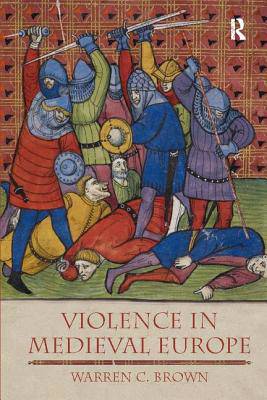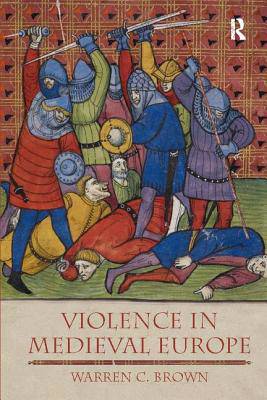
- Retrait gratuit dans votre magasin Club
- 7.000.000 titres dans notre catalogue
- Payer en toute sécurité
- Toujours un magasin près de chez vous
- Retrait gratuit dans votre magasin Club
- 7.000.0000 titres dans notre catalogue
- Payer en toute sécurité
- Toujours un magasin près de chez vous
Description
The European Middle Ages have long attracted popular interest as an era characterised by violence, whether a reflection of societal brutality and lawlessness or part of a romantic vision of chivalry. Violence in Medieval Europe engages with current scholarly debate about the degree to which medieval European society was in fact shaped by such forces.
Drawing on a wide variety of primary sources, Warren Brown examines the norms governing violence within medieval societies from the sixth to the fourteenth century, over an area covering the Romance and the Germanic-speaking regions of the continent as well as England. Scholars have often told the story of violence and power in the Middle Ages as one in which 'private' violence threatened and sometimes destroyed 'public' order. Yet academics are now asking to what degree violence that we might call private, in contrast to the violence wielded by a central authority, might have been an effective social tool. Here, Brown looks at how private individuals exercised violence in defence of their rights or in vengeance for wrongs within a set of clearly understood social rules, and how over the course of this period, kings began to claim the exclusive right to regulate the violence of their subjects as part of their duty to uphold God's order on earth.
Violence in Medieval Europe provides both an original take on the subject and an illuminating synthesis of recent and classic scholarship. It will be invaluable to students and scholars of history, medieval studies and related areas, for the light it casts not just on violence, but on the evolution of the medieval political order.
Spécifications
Parties prenantes
- Auteur(s) :
- Editeur:
Contenu
- Nombre de pages :
- 344
- Langue:
- Anglais
- Collection :
Caractéristiques
- EAN:
- 9781138425408
- Date de parution :
- 28-06-17
- Format:
- Livre relié
- Format numérique:
- Genaaid
- Dimensions :
- 156 mm x 233 mm
- Poids :
- 452 g

Les avis
Nous publions uniquement les avis qui respectent les conditions requises. Consultez nos conditions pour les avis.






